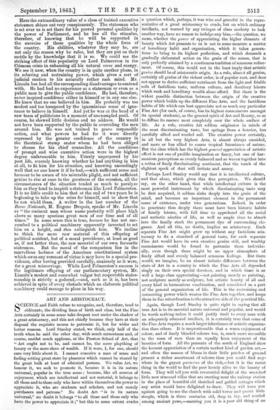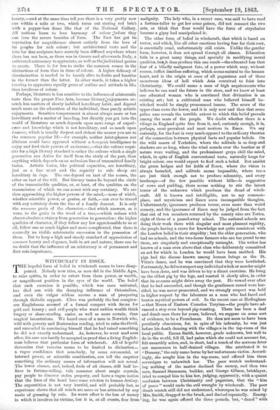ART AND ARISTOCRACY.
6IENCE and Faith refuse to recognize, and, therefore, tend to 13 obliterate, the dividing lines of birth and class, but the Fine Arts certainly in some sense take deepest root under the shadow of a great aristocracy, and this not chiefly because they have at their disposal the requisite means to patronize it, but for wider and better reasons. Lord Stanley stated, we think, only half of the truth when he said the other day, with much earnestness and, of course, amidst much applause, at the Preston School of Art, that "Art ought not to be, and cannot be, the mere plaything of luxury or the mere slave of wealth. If it were, I, for one, should care very little about it. I cannot conceive a man of sense and feeling setting great store by pleasures which cannot be shared by the great bulk at least of educated persons. We value Art, we honour it, we seek to promote it, because it is in its nature universal, popular in the true sense ; because, like all sources of enjoyment which are intellectual and not material, it belongs to all those and to those only who have within themselves the power to appreciate it, who are students and scholars, and not merely purchasers and patrons." No doubt Art "is in its nature universal," no doubt it belongs "to all those and those only who . have the power to appreciate it ;" but this to some extent evades I a question which, perhaps, it was wise and graceful in the repre- sentative of a great aristocracy to evade, but on which ordinary intellects, not warned by any twinges of class modesty to look another way, have no reason to indulge any bias,—the question, we mean, whether the power of appreciating the higher elements of beauty which Art presents to us is not in some measure a matter of hereditary habit and organization, which it takes genera- tions to bring to its highest perfection, and which demands a gradually elaborated action on the grain of the senses, that is only perfectly attained by a continuous tradition of sensuous refine- ment. Of course, this would not in the least imply that artistic genius should be of aristocratic origin. As a rule, almost all genius, certainly all genius of the richest order, is of popular root, and does not appear to derive sufficient nutriment from the light and friable soils of fastidious taste, uniform culture, and desultory leisure which rank and hereditary wealth alone afford. But there is the widest possible distinction between the origin of the creative power which builds up the different Fine Arts, and the fastidious habits of life which can best appreciate not so much any particular Fine Art (for each, of course, has its highest connoisseurs amongst its special students), as the general spirit of Art and Beauty, so as to diffuse its essence most completely over the whole surface of life. As a rule, creative Art seldom originates in minds of the most discriminating taste, but springs from a heavier, less carefully sifted and weeded soil. The creative power certainly, in all but the very highest Arts, is almost always onesided, and more or less allied to coarse tropical luxuriance of nature. But the class which has the highest general appreciation of artistic effect is not one of prolific imagination or fancy, but one of har- monious perceptions so evenly balanced and so woven together into a retina of finely discriminating sentiment, that the touch of the slightest speck of dust will irritate and annoy.
Perhaps Lord Stanley would say that it is intellectual culture, and that alone, which gives this fine perception. We should say, on the other hand, that while intellectual culture is the most powerful instrument by which discriminating taste may be first acquired, it seldom sinks deeply into the grain of the mind, and becomes an important element in the permanent sense of existence, under two generations. Indeed, in order to penetrate thus deeply there must have been historic habits of family leisure, with full time to apprehend all the social and sesthetic niceties of life, as well as ample time to absorb into the family stock the permanent dye of surrounding ele- gance. And all this, no doubt, implies an aristocracy. Each separate Fine Art might grow up without any fastidious aris- tocracy to fix a standard of general taste, for each separate Fine Art would have its own creative genius still, and wealthy connoisseurs would be found to patronize them individu- ally, even though there might be no upper atmosphere of finely sifted and evenly balanced sensuous feelings. But there would, we imagine, be an almost infinite difference between the state of Art in a country in which the Fine Arts all depended singly on their own special devotees, and in which there is as well a large class appreciating—not painting merely as painting, not sculpture merely as sculpture, but artistic beauty of all and every kind in harmonious combination, and considered as a part of the general organization of life. This is the restraining and connecting power which weaves the Fine Arts together, and keeps them in due subordination to the attractive side of the practical life.
Again, though Lord Stanley is quite right in saying that all true Art is in its essential nature universal and popular, and would be worth nothing unless it could justify itself to every man with an adequately educated intellect, it is certainly true that some of the Fine Arta require a much larger inheritance of artistic organiza- tion than others. It is unquestionable that a warm enjoyment of colour, and of finely blended colours too, is, much more accessible to the mass of men than an equally keen enjoyment of the beauties of form. All the peasants of the south of England show the keenest appreciation of a certain modest kind of garden art,— and often the masses of bloom in their little patches of ground present a richer assortment of colours than you could find any- where in the gayest parterres of the rich,—but it is the rarest thing in the world to find the poor keenly alive to the beauty of form. They will tell you with reverential delight of the wretched little new stuccoed villas that are erecting near the railway station in the place of beautiful old thatched and gabled cottages which any artist would have delighted to draw. They will warn you against going to see the church with solid tower and quaint little steeple, which is three centuries old, deep in ivy, and nestled among ancient yews,—assuring you it is a poor old thing of no
beanty,—and at the same time tell you there is a very pretty new one within a mile or two, which turns out staring red brick with a pepper-box dome like that of the National Gallery. All nations learn to love harmony of colour :before they can- love the severe beauties of form. The East has got its reputation for magnificence almost entirely from the love of its peoples for rich- colour ; but architectural taste and the love for fine sculpture have scarcely been diffused anywhere where there has not been, as there was in Greece and afterwards Italy, a cultivated aristocracy to appreciate, as well as the:individual genius to create. There is far less to strike the common senses in the distinctions of form than in those of colour. A higher delicacy of discrimination is needed to be keenly :dive to faults and beauties in the former than the latter. In other words, it takes a higher breeding to appreciate equally grace of outline and attitude in life; than loveliness of colour.
Perhaps, literature is less sensitive to the influence of aristocratic taste than the proper Fine Arts, because literary:enjoyments are much less matters of slowly imbibed hereditary habit, and depend much more on the education of the individual, than purely artistic enjoyments. Sensitive temperament is almost always more or less hereditary and a matter of breeding, but directly you get into the world of literature so much depends upon mere range of experi- ence and knowledge which is not hereditary, and so much upon humour, which is usually deepest and richest the nearer you are to the common popular life— for example, neither Aristophanes nor Dickens could have appeared without a bourgeois intelligence to ,enjoy and feed their powers of caricature,—that the culture requi- site for a high literary standard is rather the culture which a single generation can derive for itself from the study of the past, than anything which depends on an unbroken line of transmitted family tastes. Artistic tastes, like political capacities, are hereditary, just as a fine scent and the sagacity to rule sheep are hereditary in dogs. The one depend on tact of the senses, the other on tact of the will. But literary tastes lie beyond the circle of the transmissible qualities, or, at least, of the qualities on the transmission of which we can count with any certainty. We are then approaching the higher powers of the mind,—none of which, svhether scientific power, or genius, or faith,— can ever be traced with any certainty down the line of a family descent. It is only the sensuous grain of the character,—that which answers, as it were, to the grain in the wood of a tree,—which refines with almost absolute certainly from generation to generation ; the higher qualities of character, if they follow any law apprehensible to us at all, follow one so much higher and more complicated, that there is assuredly no visible aristocratic succession in the possession of them. But to keep a high and steady standard of appreciation of sensuous beauty and elegance, both in art and nature, there can be no doubt that the influence -of an aristocracy is of permanent and first-rate importance.































 Previous page
Previous page